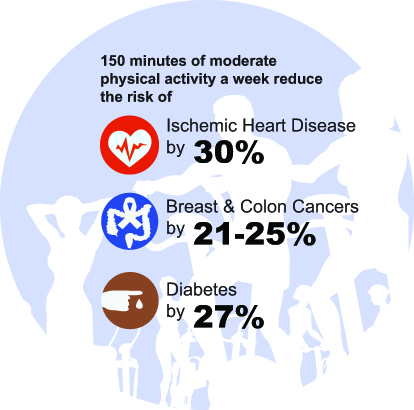News
‘Get fit’ policy planned for office workers
Office workers will be urged to engage in physical fitness exercises during the working day to combat alarming levels of bad health in those aged 35 years and above.
The Health Ministry’s workforce screening programmes have found that most employees aged 35-60 suffer from diabetes, cholesterol, cardiovascular diseases, hypertension and chronic respiratory diseases.
The Ministry’s workforce screening programme initiated in 2013 had mobile teams consisting of a medical officer attached to the district Non-Communicable Diseases Unit and Medical officers of Health (MOHs) in the respective areas.
The findings have prompted the Health Ministry to introduce a policy on physical fitness/activity to be implemented in state and private institutions.
The ministry’s Nutrition Division chief, Dr. Senerath Mahamithawa, said, officials plan to initially implement the policy in state institutions and talks are being planned with the Public Administration Ministry.
“At the last NCD Advisory Committee it was decided to immediately commence discussions with relevant authorities on setting up physical fitness centres in state institutions or introducing physical fitness programmes,” he said.
 As a pilot project, institutions attached to the Health Ministry will have physical fitness/activity centres equipped with a treadmill, exercise bicycle, few weights and other fitness equipment.
As a pilot project, institutions attached to the Health Ministry will have physical fitness/activity centres equipped with a treadmill, exercise bicycle, few weights and other fitness equipment.
Public Administration Ministry secretary J. Dadallage, said the ministry is willing to implement fitness programmes jointly with the Health Ministry.
“In countries like Japan and China the public service is efficient as employees have fitness exercises, especially in the morning. Initially, a 10-minute exercise routine can be introduced,” he said.
Mr. Dadallage said once finalised the Ministry would send instructions to State institutions to promote physical fitness and motivate state sector employees highlighting the importance of it.
Previously in 2011, patients visiting 658 Healthy Lifestyle Clinics in district hospitals revealed lack of physical exercises as one of the main contributor to increased NCDs. This led to walking paths being built in Colombo city and the suburbs by the Urban Development Authority and the Road Development Authority.
“The State sector has zero physical fitness programmes unlike some private sector companies that provide their employees with membership at gyms, swimming pools and fitness centres,” Dr.Mahamithawa said.
“Both the state and private sector should realise that if the majority of their workforce is suffering from NCDs it would affect the overall productivity and even the country’s development,” Dr. Mahamithawa said.
He said a policy on physical activity would make employers concerned about the physical wellbeing of their employees.
Dr. Mahamithawa said changes would have to be introduced in offices along with the fitness regimes. “A majority of female employees wear saree. Therefore we need to have proper dressing rooms,” he said.
One fitness centre has already been set up at the Medical Research Institute (MRI). Another is to be set up at the Health Education Bureau and Castle Street Maternity Hospital, he said.
There are challenges ahead, however, as physical fitness requires attitude change as well as time allocation.
“Travelling via public transport during rush does not constitue physical fitness,” Dr. Mahamithawa said commenting on the belief among some commuting workers that that’s sufficient exercise.
“There is reluctance to engage in physical activity,” the Health Ministry’s Non-Communicable Diseases Division Director Dr. Tilak Siriwardena said. “The absence of a healthy diet and physical activity are the leading causes for NCDs apart from smoking and consuming alcohol.”
“Mornings are the best time for fitness programmes,” Dr. Siriwardena said. “But this has to be implemented in a way that it doesn’t cause an inconvenience. We have physical instructors from the Sri Lanka Foundation Institute who are willing to be volunteers in pilot projects.”
He said the areas they have to look into are whether employees would make use of the centres and whether providing common membership to outside fitness centres would be cheaper than setting up new gyms.
The Ministry says 150 minutes of moderate physical activity a week has been estimated to reduce the risks of ischeamic heart disease by 30 per cent, diabetes by 27 per cent and of breast and colon cancers by 21-25 per cent. In Sri Lanka, non communicable diseases accounted for 71 percent of total deaths.
Health Ministry’s NCD division’s former director Dr. Thalatha Liyanage said a majority of those who attend workplace screening and healthy lifestyle clinics were females.
“It is important to get males to go through the screening process. The Health Ministry should continuously provide glucometers, strips and blood pressure apparatus and strengthen the screening process while encouraging those with risk to indulge in physical exercise,” she said.
According to the World Health Organisation, 80 percent of heart diseases and stroke, 80 percent of Type 2 diabetes and 40 percent of cancers could be prevented through a healthy diet, physical activity and the avoidance of alcohol and tobacco.

